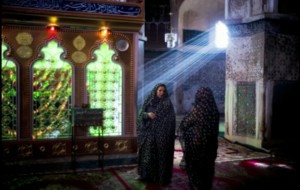“My aim is to give a voice to the silent people, to show the hidden lights behind the curtain of the great game, the small worlds ignored by the media and the prophets of a global conflict.”
Monika Bulaj was born in Warsaw, Poland in 1966 and studied Polish philology at the University of Warsaw.
Although Polish is her mother tongue she also speaks Italian, French, English, German, Russian and other Slavic languages, some Spanish and at present is studying Arab and Persian
Monika is a photographer, reporter and documentarian who classifies the main areas of her research as “The Borders of Faiths” (mystic, archetypes, divination, possession, pilgrims, body, cult of the dead) and minorities, nomads, migrants, outcasts, dispossessed, in Asia, Europe, and Africa.
Among other things she has published many books and articles, given many presentations of her work and had over 50 solo exhibitions,.
In this TED talk she shares some of her work on her project “The hidden light of Afghanistan”, an inspiring work of photojournalism and insight into the hidden lives of an ancient people in a world now devastated by war.
“My travels to Afghanistan began many, many years ago on the eastern border of my country, my homeland, Poland. I was walking through the forests of my grandmother’s tales. A land where every field hides a grave, where millions of people have been deported or killed in the 20th century.
I have been walking east for 20 years
Behind the destruction, I found a soul of places. I met humble people. I heard their prayer and ate their bread. Then I have been walking East for 20 years — from Eastern Europe to Central Asia — through the Caucasus Mountains, Middle East, North Africa, Russia. And I ever met more humble people. And I shared their bread and their prayer. This is why I went to Afghanistan.
One day, I crossed the bridge over the Oxus River. I was alone on foot. And the Afghan soldier was so surprised to see me that he forgot to stamp my passport. But he gave me a cup of tea. And I understood that his surprise was my protection.
Noor, the Hidden Light of Afghanistan
So I have been walking and traveling, by horses, by yak, by truck, by hitchhiking, from Iran’s border to the bottom, to the edge of the Wakhan Corridor. And in this way I could find noor, the hidden light of Afghanistan. My only weapon was my notebook and my Leica. I heard prayers of the Sufi — humble Muslims, hated by the Taliban. Hidden river, interconnected with the mysticism from Gibraltar to India. The mosque where the respectful foreigner is showered with blessings and with tears, and welcomed as a gift.
What Do We Know About the Country and the People that We Pretend to Protect?
What do we know about the country and the people that we pretend to protect, about the villages where the only one medicine to kill the pain and to stop the hunger is opium? These are opium-addicted people on the roofs of Kabul 10 years after the beginning of our war. These are the nomad girls who became prostitutes for Afghan businessmen.
What do we know about the women 10 years after the war? Clothed in this nylon bag, made in China, with the name of burqa. I saw one day, the largest school in Afghanistan, a girls’ school. 13,000 girls studying here in the rooms underground, full of scorpions. And their love [for studying] was so big that I cried.
What do we know about the death threats by the Taliban nailed on the doors of the people who dare to send their daughters to school as in Balkh? The region is not secure, but full of the Taliban, and they did it.
My aim is to give a voice to the silent people, to show the hidden lights behind the curtain of the great game, the small worlds ignored by the media and the prophets of a global conflict.”
——————-
http://www.monikabulaj.com/eng/
———————-
Below is a selection of extracts from press statements about her work.
“If you suspect that the ancient faith does not lie in the choked squares, the marble cathedrals or the great metropolis, but rather in the periphery, in the forgotten villages on the farthest borders of the empire, then you should visit the work of Monika Bulaj”.”
Paolo Rumiz, La Repubblica, Rome
“If justice belonged to this world, “People of God” would be a textbook in every school of the world. Thanks to a moving and elegant writing style, and to dozens and dozens of photographs, this book confirms how people of different ethnic origin, nationality, and religion can and do live together. … The faces worn by time, endless and without a beginning, caught behind windows that look as if they have never been opened, behind dusty glass panels which, if broken, are never replaced; …. the villages lost in remote and distant regions, almost crystallized by ice and snow…”
Alessandro Marrongiu, Liberal, Turin
“Monika Bulaj is a “light hunter”. Rather than being interested in the boundaries among different cultures, she is focused on the spaces where what was impossible to blend has actually blended. Hers are simply provocations to those who believe in solid and established truths. She thinks that respect means to work without flash, because she is looking for the light, even when there is only shadow, and the details and outlines are blurred. This is how she creates her images that suggest action and motion.”
Christiane Schlotzer, Suddeutsche Zeitung, Munich



